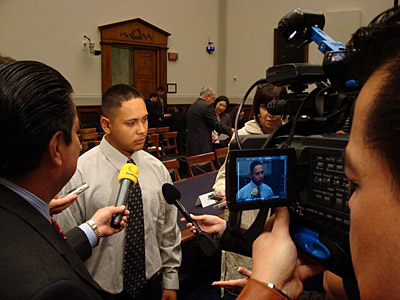At an April 2 hearing by two House Judiciary Committee subcommittees entitled "The Public Safety and Civil Rights Implications of State and Local Enforcement of Federal Immigration Laws," Representative Steve King (R-Iowa) raced through a rapid tangled and convoluted litany of immigration laws. His bottom line? Racial profiling is a good thing.
Both he and Representative Lamar Smith (R-Texas) used scare tactics to justify profiling, conflating undocumented immigrants and terrorists, invoking 9/11, and telling stories of immigrant criminals. Of course, the facts just don't support their conclusions. In fact, immigrant men are five times less likely to be incarcerated than native-born men.
It was a while before we were able to hear the witnesses rebut King and Smith's opening arguments. The committee recessed for over an hour for votes. During that time, we discovered what a rock star witness the ACLU helped bring to the hearing. Julio Cesar Mora, a 19-year-old citizen from Avondale, Virginia, fielded rapid-fire questions in English and Spanish from journalists for nearly the entire recess.

Julio Cesar Mora answered questions from the media.
When the committee returned, Mora turned his attention to lawmakers. He talked about his experience in Arizona with Maricopa County Sheriff Joe Arpaio's version of justice. As Mora and his father drove to work — obeying all traffic signals — two black SUVs sandwiched his vehicle and forced them to an abrupt stop. Mora and his father were forced to leave their car, had their hands tied with zip ties, and were taken to the father's worksite where a raid was underway. Mora's father, a diabetic, was repeatedly denied permission to use the bathroom, and the two were separated.
Mora was also humiliated by deputies who forced him to urinate with his hands cuffed and mocked him for not being able to do so. In the end, they waited, standing, for over three hours until they were finally allowed to leave, because Mora is a citizen, and his father is a legal permanent resident.
Mora was joined on the panel by Antonio Ramirez, a community advocate and naturalized citizen, from Frederick County, Maryland. Ramirez brought a copy of the Constitution to the hearing, as well as proof of his citizenship. (I guess if I had brown skin in a county where race is routinely used as a pretext to stop drivers to check immigration status, I would carry proof of my citizenship as well.)
Deborah Weissman, a University of North Carolina law professor and co-author of a report on local immigration enforcement with the ACLU of North Carolina, was the third member of the panel. She emphasized the importance of considering local history, explaining that North Carolina has a history of white supremacy. In fact, proponents of these so-called 287 (g) agreements between ICE and local law enforcement in North Carolina have made openly racist statements. For example:
In an interview with the Raleigh News & Observer, Alamance County Sheriff Terry Johnson [who implements the 287(g) program there] . . . made brazenly racist claims about Mexicans, stating, "[t]heir values are a lot different — their morals — than what we have here . . . In Mexico, there's nothing wrong with having sex with a 12-, 13-year-old girl ... They do a lot of drinking down in Mexico." (p. 4 of her testimony)
Agreements that authorize local enforcement of federal immigration laws give Johnson and others like him unchecked power to act on their hate.
So when scare tactics did not make the case for racial profiling, anti-immigrant advocates turned to sympathy.
The final panelist and the minority witness was Ray Tranchant, whose daughter and her best friend were killed by a drunk driver who happened to be an undocumented immigrant. While I (and everyone present) feel horrible for his loss (and, perhaps, worse for the young women whose lives were cut short), he was used to make the argument, that, as Rep. King put it, we have a "choice between political correctness and keeping America safe." The ACLU has repeatedly argued that this is a false choice, and that could not have been clearer at this hearing.
At times, even Tranchant sounded like he should be testifying at a hearing on drunk driving rather than a hearing on immigration law. During the question and answer session, he explained that he is the son of an immigrant, and that "we don't want undesirable people in America; we don't want drunks, but we do want desirable people here." That is something we can all agree upon. As, Representative Sheila Jackson-Lee (D-Texas) put it, Tranchant's issue is about drunk driving, and Ramirez explained, "I have been here for 21 years and have never killed anyone; alcohol is sold to everyone."
Representative Luis Gutierrez (D-Ill.) noted that throughout history, immigrants' reputations, whether they were Irish or Italian, have often been tarnished by the actions of a few criminals, and history has rendered those misperceptions of entire classes of people based on the actions of a few ridiculous.
He pointed out that immigrant criminals do most of their damage in the immigrant communities they live in, and immigrants themselves want to be rid of them. If immigrants feel that they cannot call the police for fear that they or someone else in their household will be deported, then those criminals will continue to be free to terrorize others. Their concerns are real.
Subcommittee Chairwoman Zoe Lofgren (D-Calif.) told a story of Rita Cote, a mother of three with a U.S. citizen husband, who was detained on immigration charges when her sister called the police to report being the victim of domestic violence; the assailant went free. During the second panel, George Gascón, Police Chief in Mesa, Arizona, and Hubert Williams, President of the Police Foundation, echoed the concern that if local law enforcement targets all immigrants, immigrants will stop coming to the police. Williams recounted a question a police chief asked him, "How do you police a community that will not talk to you?"
Additionally, if local law enforcement is spending its energy stopping Latino drivers who are obeying traffic laws or setting up check-points in front of Latino churches, as Weissman has witnessed in North Carolina, they are wasting resources that they could be using to capture real criminals, including drunk drivers.
In the case of local immigration enforcement, we can actually keep America safer by being "politically correct" and ending racial profiling. Therefore, the ACLU applauds the subcommittees for holding this hearing and calls for the suspension of all 287(g) agreements.

